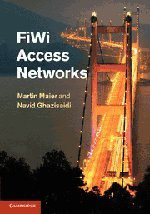Table Of ContentFiWiAccessNetworks
The evolution of broadband access networks toward bimodal fiber-wireless (FiWi)
accessnetworks,describedinthisbook,maybeviewedastheendgameofbroadband
access. After discussing the economic impact of broadband access and current world-
widedeploymentstatistics,allthemajorlegacywirelineandwirelessbroadbandaccess
technologies are reviewed. State-of-the-art GPON and EPON fiber access networks
are described, including their migration to next-generation systems such as OCDMA
andOFDMAPONs.Thelatestdevelopmentsofwirelessaccessnetworksarecovered,
including VHT WLAN, Gigabit WiMAX, LTE, and WMN. The advantages of FiWi
access networks are demonstrated by applying powerful network coding, heteroge-
neous optical and wireless protection, hierarchical frame aggregation, hybrid routing,
and QoS continuity techniques across the optical–wireless interface. The book is an
essentialreferenceforanyoneworkingonopticalfiberaccessnetworks,wirelessaccess
networks,orconvergedFiWisystems.
MartinMaier is an Associate Professor at the Institut National de la Recherche Scien-
tifique (INRS), University of Québec, and the Founder and Creative Director of the
OpticalZeitgeistLaboratory.HereceivedhisPhDdegreeinelectricalengineeringfrom
theTechnicalUniversityBerlin,Germanyandamongsthisawardshewasaco-recipient
ofthe2009IEEECommunicationsSocietyBestTutorialPaperAward.Heistheauthor
ofOpticalSwitchingNetworks(CambridgeUniversityPress,2008).
Navid Ghazisaidi is an R&D Systems Engineer at Ericsson Inc., San Jose, USA.
He received his PhD degree in Telecommunications from the University of Québec,
Canada and participated in the prestigious European research projects BIONETS
(BIOlogically-inspired autonomic NETworks and Services) and ACCORDANCE (A
ConvergedCopper-Optical-RadioOFDMA-basedAccessNetworkwithhighCapacity
andflExibility).
“The area of FiWi networks is central to the current evolution path of networks but
presentssignificantchallenges,inparticularinintegratingdisparatesystems.Thisbook
providesacogentandhighlyusefulexpositionofthemaintechnologiesinFiWi,includ-
ingnotonlytraditionaltechniques,butalsoveryrecentdevelopmentssuchasnetwork
coding.Thisbookisatoolbothforworkingengineersandforresearchersenteringthe
FiWiareafromtheopticsorfromthewirelessdomains”.
ProfessorMurielMédard,MassachusettsInstituteofTechnology
FiWi Access Networks
MARTIN MAIER
UniversitéduQuébec,Montréal
NAVID GHAZISAIDI
R&DPDUBroadbandAccess,EricssonInc.
CAMBRIDGEUNIVERSITYPRESS
Cambridge,NewYork,Melbourne,Madrid,CapeTown
Singapore,SãoPaulo,Delhi,Tokyo,MexicoCity
CambridgeUniversityPress
TheEdinburghBuilding,CambridgeCB28RU,UK
PublishedintheUnitedStatesofAmericabyCambridgeUniversityPress,NewYork
www.cambridge.org
Informationonthistitle:www.cambridge.org/9781107003224
(cid:2)c CambridgeUniversityPress2012
Thispublicationisincopyright.Subjecttostatutoryexception
andtotheprovisionsofrelevantcollectivelicensingagreements,
noreproductionofanypartmaytakeplacewithoutthewritten
permissionofCambridgeUniversityPress.
Firstpublished2012
PrintedintheUnitedKingdomattheUniversityPress,Cambridge
AcatalogrecordforthispublicationisavailablefromtheBritishLibrary
LibraryofCongressCataloginginPublicationdata
Maier,Martin,1969–
FiWiaccessnetworks/MartinMaier,NavidGhazisaidi.
p. cm.
Includesbibliographicalreferencesandindex.
ISBN978-1-107-00322-4(hardback)
1. FiWiaccessnetworks. 2. Wirelesscommunicationsystems. 3. Opticalfiber
communication. I. Title.
TK5105.775
[.M34 2012]
(cid:3)
621.3981–dc23
2011035787
ISBN978-1-107-00322-4Hardback
CambridgeUniversityPresshasnoresponsibilityforthepersistenceor
accuracyofURLsforexternalorthird-partyinternetwebsitesreferredto
inthispublication,anddoesnotguaranteethatanycontentonsuch
websitesis,orwillremain,accurateorappropriate.
Tomyparents
M.M.
Totheloveofmylife
N.G.
Contents
Listoffigures pagexiii
Listoftables xvii
Preface xix
Acknowledgments xxi
PartI Introduction 1
1 Broadbandaccess 3
1.1 Definition 3
1.2 Economicimpact 4
1.3 Coverage 5
1.4 Forecast 10
2 Legacybroadbandtechnologies 15
2.1 Fixedwirelinebroadbandtechnologies 15
2.1.1 Digitalsubscriberline 15
2.1.2 Cablemodem 20
2.1.3 Broadbandoverpowerline 23
2.2 Fixedwirelessbroadbandtechnologies 25
2.2.1 MMDS 25
2.2.2 Freespaceoptics 27
2.2.3 Satellite 28
2.3 Mobilewirelessbroadbandtechnologies 30
2.3.1 GPRS 30
2.3.2 EDGE 32
2.3.3 UMTS 35
PartII Fiberaccessnetworks 39
3 GPON 45
3.1 Architecture 45
3.1.1 Videooverlay 45
3.1.2 Protection 46
viii Contents
3.2 Wavelengthallocation 47
3.3 GPONencapsulationmethod 48
3.3.1 Frameformats 48
3.3.2 GEM 49
3.4 Bandwidthallocation 50
4 EPON 51
4.1 Architecture 52
4.2 Multipointcontrolprotocol 53
4.3 Dynamicbandwidthallocation(DBA) 54
4.3.1 Statisticalmultiplexingmethods 55
4.3.2 AbsoluteQoSassurances 57
4.3.3 RelativeQoSassurances 60
4.3.4 DecentralizedDBAalgorithms 62
4.4 10G-EPON 63
5 Next-generationPON 65
5.1 NG-PON1 67
5.1.1 XG-PON 67
5.1.2 Long-reachXG-PON 67
5.1.3 WDMXG-PON 68
5.2 NG-PON2 68
5.2.1 Wavelength-routingPON 69
5.2.2 OCDMAPON 70
5.2.3 OFDMAPON 71
PartIII Wirelessaccessnetworks 73
6 WiFi 75
6.1 LegacyWLAN 75
6.2 QoSinWLAN 78
6.2.1 EDCA 79
6.2.2 HCCA 80
6.3 HTWLAN 81
6.3.1 Frameaggregation 81
6.3.2 Reversedirectionprotocol 82
6.3.3 Bandwidthefficiencytechniques 83
6.4 VHTWLAN 84
6.4.1 VHTL6 84
6.4.2 VHT60 85
6.4.3 VHTapplications 85
Contents ix
7 WiMAX 86
7.1 FixedWiMAX 86
7.1.1 PHYlayer 86
7.1.2 MAClayer 86
7.2 MobileWiMAX 89
7.2.1 QoSinmobileWiMAX 90
7.2.2 MobileWiMAXhandover 91
7.3 Next-generationWiMAX 93
7.3.1 MultihoprelayWiMAX 93
7.3.2 GigabitWiMAX 95
8 LTE 98
8.1 PHYlayer 98
8.2 MAClayer 100
8.2.1 Resourceallocation 100
8.2.2 Retransmission 101
8.3 Powersaving 102
8.4 Handover 103
8.5 LTE-Advanced 103
9 Wirelessmeshnetworks 105
9.1 Characteristics 105
9.2 WiFi-basedWMN 106
9.2.1 Routingprotocols 106
9.2.2 MACprotocols 109
9.3 WiMAX-basedWMN 110
9.3.1 Architecture 110
9.3.2 Scheduling 110
PartIV FiWiaccessnetworks 111
10 RoFvs.R&Fnetworks 117
10.1 Enablingtechnologies 120
10.1.1 RoFtechnologies 120
10.1.2 R&Ftechnologies 122
10.2 State-of-the-arttestbeds 122
10.2.1 RoFtestbed 123
10.2.2 R&Ftestbed 123
10.3 Challengesandopenissues 124
10.4 Summary 125
11 Architectures 127
11.1 Cellulararchitectures 127
x Contents
11.1.1 Movingcell 129
11.1.2 Movingextendedcell 129
11.1.3 Outdoorvs.indoor 130
11.2 WiMAX-basedarchitectures 130
11.2.1 IntegratedEPON-WiMAX 130
11.2.2 SuperMAN 131
11.3 WiFi-basedarchitectures 133
11.3.1 Unidirectionalring 133
11.3.2 Bidirectionalring 134
11.3.3 Hybridstar-ring 135
11.3.4 Unidirectionalring-PON 136
11.4 Summary 137
12 Networkplanningandreconfiguration 138
12.1 ONUplacement 138
12.2 Inter-ONUcommunications 139
12.2.1 Peer-to-peercommunications 139
12.2.2 FiWivs.WMNnetworks 141
12.2.3 Directinter-ONUcommunications 141
12.3 Reconfiguration 142
12.3.1 MARIN 143
12.3.2 GROW-Net 143
12.4 Summary 145
13 Techno-economicanalysis 146
13.1 Totalcostofnetworkownership 147
13.1.1 CAPEX 147
13.1.2 OPEX 147
13.2 ComparativeanalysisofEPONandWiMAX 148
13.2.1 Techno-economicmodel 148
13.2.2 Techno-economicevaluation 149
13.3 Numericalresults 153
13.4 Summary 158
14 Networkcoding 160
14.1 NetworkingcodinginPON 160
14.2 NetworkcodinginNG-PONs 161
14.2.1 Inter-flownetworkcoding 162
14.2.2 Intra-flownetworkcoding 163
14.2.3 Metro-accessnetworks 163
14.3 NetworkcodinginFiWiaccessnetworks 165
14.3.1 Performanceenhancement 165
14.3.2 Resilience 167

